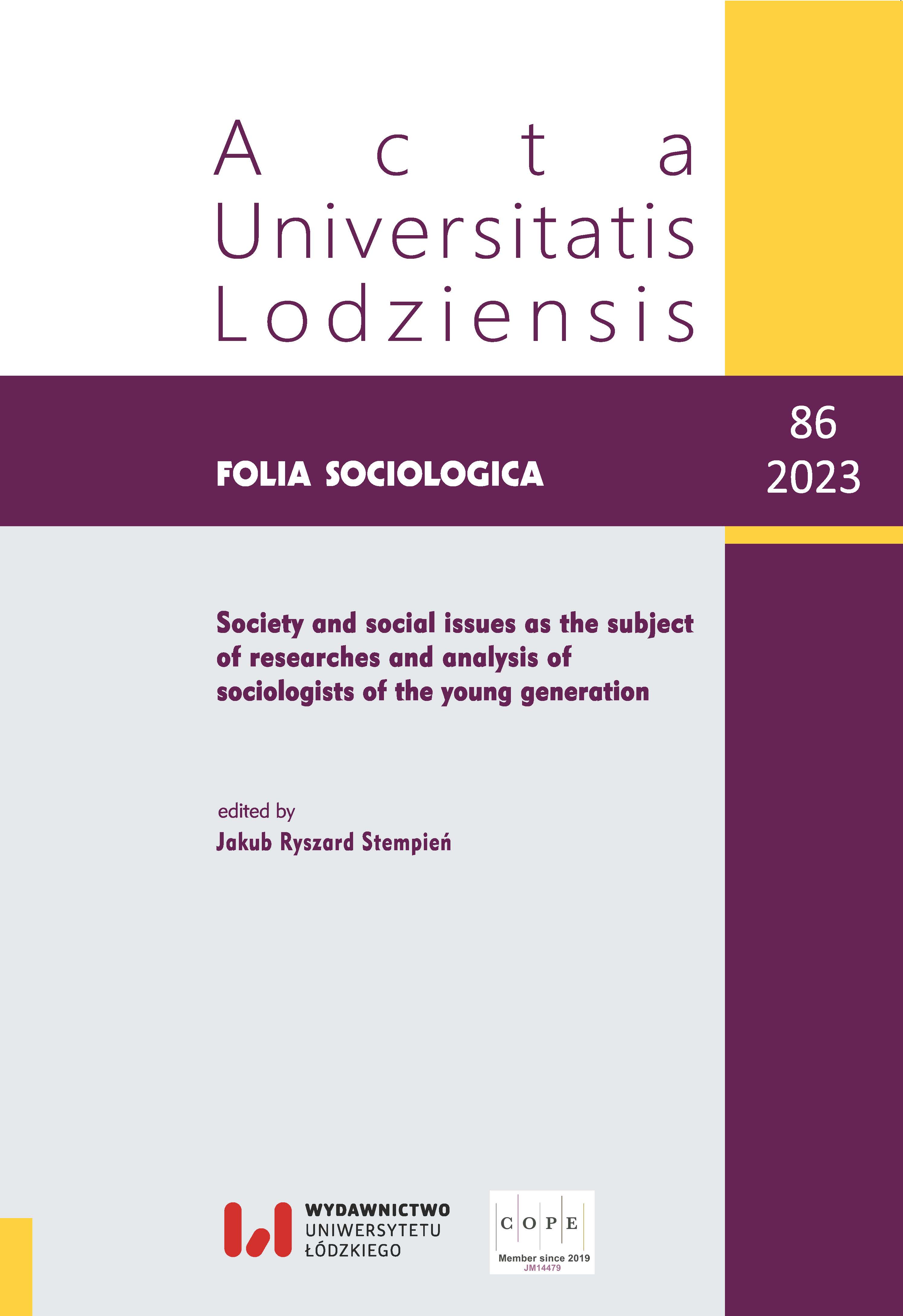Ritual in sport – an empirical study of table tennis players
DOI:
https://doi.org/10.18778/0208-600X.86.03Keywords:
ritual, the social dimension of sports, contemporary, table tennis players, quantitative surveyAbstract
The article was devoted to analysing the specifics of the phenomenon of rituals and their social impact. Ritual activities can be diverse, and their characteristics are likely to be specific only to certain social groups. The peri-sport sphere is exceptionally saturated with ritual practices, and the interest in this phenomenon may be compounded by the fact that sports are a relatively under-researched area from a social perspective. In analysing aspects related to the practices in question, it was necessary to refer to psychological mechanisms, an anthropological perspective and a key one – the sociological approach of such theorists as Randall Collins, Erving Goffman, and Émile Durkheim.
In the remainder of the article, spectator and highly media-oriented sports were primarily scrutinised. These disciplines were chosen because the players practising them are characterised by a high degree of use of rituals, and they are activities that allow for more straightforward observation of many of the attributes associated with the practices in question. Prioritised in the context of this article was the analysis of a self-reported survey conducted on professional table tennis players. The fundamental data collection method was an online survey, the results augmented by participant observation. The purpose of the study was to find out the specifics of table tennis players’ rituals. Devoting attention to the plane associated with table tennis was essential due to the lack of scientific information on this social group and the widespread use of rituals by the players surveyed. As a result, the issue of athletes’ rituals was enriched with information on players’ habits of another exciting sport – table tennis.
References
Babbie E. (2013), Logika doboru próby, transl. A. Kloskowska-Dudzińska, [in:] Badania społeczne w praktyce, Warszawa.
Google Scholar
Bleak J.L., Frederick C.M. (1998), Superstitious behaviour in sport: Levels of effectiveness and determinants of use in three collegiate sports, “Journal of Sport Behavior”, vol. 21(1), Washington.
Google Scholar
CBOS (2018), Komunikat z badań: Przesądny jak Polak, Nr 93/2018, https://www.cbos.pl/SPISKOM.POL/2018/K_093_18.PDF
Google Scholar
Ciok A., Lenartowicz M. (2020), Sportowi migranci. Zagraniczni zawodnicy w polskich ligach tenisa stołowego, Warszawa.
Google Scholar
Collins R. (2011), Łańcuchy rytuałów interakcyjnych, transl. K. Suwada, Kraków.
Google Scholar
Doliński D. (2002), Wpływ społeczny a jakość życia, [in:] Psychologia jakości życia, vol. 1, Warszawa.
Google Scholar
Durkheim É. (2010), Elementarne formy życia religijnego, transl. A. Zdrożyńska, Warszawa.
Google Scholar
Frankfort-Nachmias Ch., Nachmias D. (2001), Metody badawcze w naukach społecznych, Poznań.
Google Scholar
Gennep van A. (2006), Obrzędy przejścia. Systematyczne studium ceremonii, Warszawa.
Google Scholar
Goffman E. (2012), Rytuał Interakcyjny, transl. A. Szulżycka, Warszawa.
Google Scholar
Golnau W. (2018), Teoretyczne podstawy i zasady kształtowania wynagrodzeń za pracę według wyników (część 1), “Zarządzanie i Finanse”, vol. 16.
Google Scholar
Hargreaves J. (1985), The Body, Sport and Power Relations, “The Sociological Review”, 33(1_suppl), https://doi.org/10.1111/j.1467-954X.1985.tb03304.x
Google Scholar
DOI: https://doi.org/10.1111/j.1467-954X.1985.tb03304.x
Jacher W. (1973), Emila Durkheima koncepcja religii jako czynnika integracji społecznej, “Studia Philosophiae Christianae”, vol. 9(2).
Google Scholar
Kubaniec D. (2021), Komunikacja niewerbalna i wykorzystanie gestów w sporcie, “Media – Kultura – Komunikacja Społeczna”, vol. 2(16).
Google Scholar
DOI: https://doi.org/10.31648/mkks.6289
Lenartowicz M., Dobrzycki A. (2019), Sumnerowski etos sportowo-rekreacyjny – obyczaje i wzory zachowań w kulturze fizycznej, [in:] Z. Dziubiński, N. Organista (eds.), Kultura fizyczna a etos, AWF Warszawa, SALOS RP, Warszawa.
Google Scholar
Maranise A. (2013), Superstition & Religious Ritual: An Examination of Their Effects and Utilisation in Sport, “Sport Psychologist”.
Google Scholar
DOI: https://doi.org/10.1123/tsp.27.1.83
Nosal P. (2023), Sportowe zakłady bukmacherskie. Społeczna praktyka grania, Wydawnictwo Naukowe UAM, Poznań.
Google Scholar
Turner M. (2012), From ‘pats on the back’ to ‘dummy sucking’: a critique of the changing social, cultural and political significance of football goal celebrations, “Soccer & Society”, vol. 13:1, https://doi.org/10.1080/14660970.2012.627164
Google Scholar
DOI: https://doi.org/10.1080/14660970.2012.627164
Turner V. (2010), Liminalność i Communitas, [in:] Proces rytualny. Struktura i antystruktura, transl. E. Dżurak, Warszawa.
Google Scholar
Vroom V.H. (1995), Work and Motivation, San Francisco.
Google Scholar
Watson N.J., Czech D.R. (2005), The Use of Prayer in Sport: Implications for Sport Psychology Consulting, “Athletic Insight – The Online Journal of Sport Psychology”.
Google Scholar
Webb E.J. (2006), Unconventionaly, Triangulation, and Inference, [in:] N.K. Denzin, Sociological Methods: A Sourcebook.
Google Scholar
Żerdziński M. (2007), Poradnik dla chorych na zespół natręctw, http://centrumpsychiatrii.home.pl/php/wyslane/aktualnosci/pliki/poradnik2.pdf
Google Scholar
Published
Versions
- 2023-09-30 (2)
- 2023-09-30 (1)
How to Cite
Issue
Section
License

This work is licensed under a Creative Commons Attribution-NonCommercial-NoDerivatives 4.0 International License.










